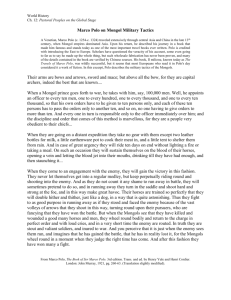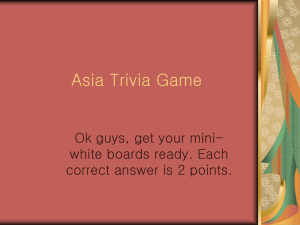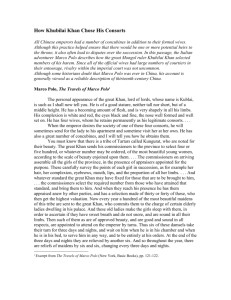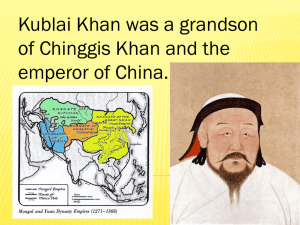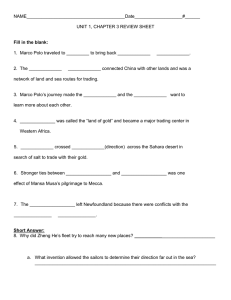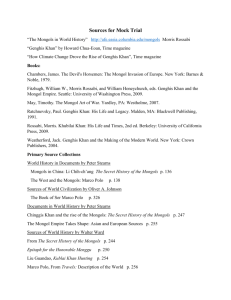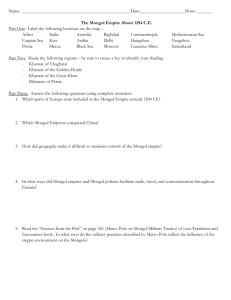Marco Polo on Chinese Society under the Mongol Rule
advertisement
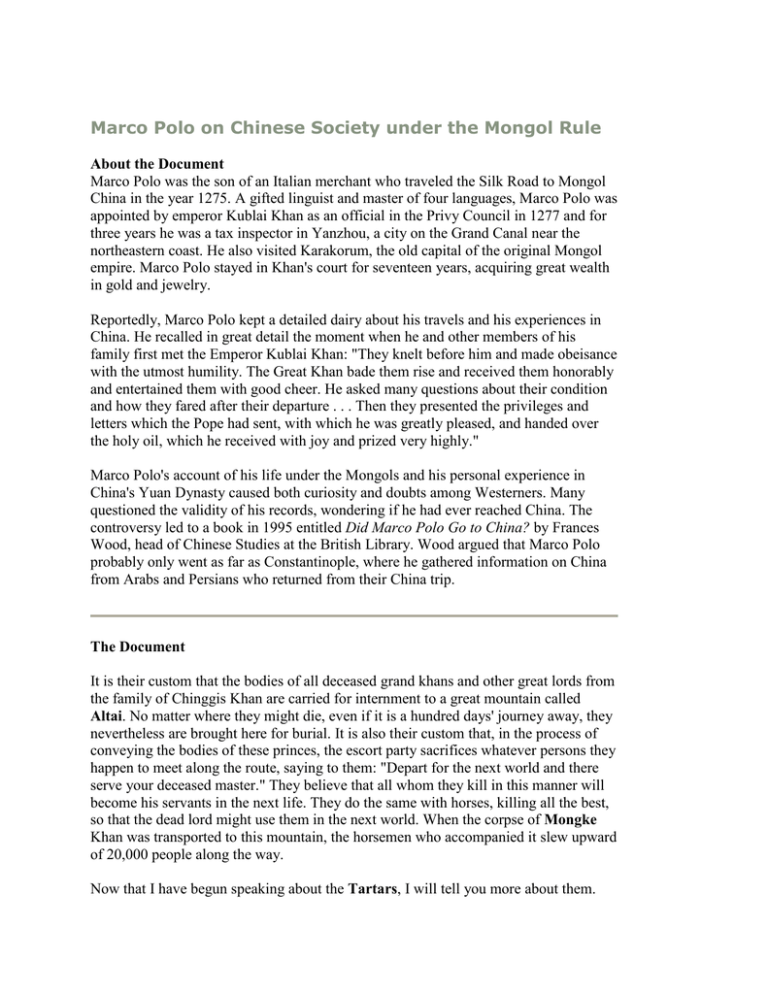
Marco Polo on Chinese Society under the Mongol Rule About the Document Marco Polo was the son of an Italian merchant who traveled the Silk Road to Mongol China in the year 1275. A gifted linguist and master of four languages, Marco Polo was appointed by emperor Kublai Khan as an official in the Privy Council in 1277 and for three years he was a tax inspector in Yanzhou, a city on the Grand Canal near the northeastern coast. He also visited Karakorum, the old capital of the original Mongol empire. Marco Polo stayed in Khan's court for seventeen years, acquiring great wealth in gold and jewelry. Reportedly, Marco Polo kept a detailed dairy about his travels and his experiences in China. He recalled in great detail the moment when he and other members of his family first met the Emperor Kublai Khan: "They knelt before him and made obeisance with the utmost humility. The Great Khan bade them rise and received them honorably and entertained them with good cheer. He asked many questions about their condition and how they fared after their departure . . . Then they presented the privileges and letters which the Pope had sent, with which he was greatly pleased, and handed over the holy oil, which he received with joy and prized very highly." Marco Polo's account of his life under the Mongols and his personal experience in China's Yuan Dynasty caused both curiosity and doubts among Westerners. Many questioned the validity of his records, wondering if he had ever reached China. The controversy led to a book in 1995 entitled Did Marco Polo Go to China? by Frances Wood, head of Chinese Studies at the British Library. Wood argued that Marco Polo probably only went as far as Constantinople, where he gathered information on China from Arabs and Persians who returned from their China trip. The Document It is their custom that the bodies of all deceased grand khans and other great lords from the family of Chinggis Khan are carried for internment to a great mountain called Altai. No matter where they might die, even if it is a hundred days' journey away, they nevertheless are brought here for burial. It is also their custom that, in the process of conveying the bodies of these princes, the escort party sacrifices whatever persons they happen to meet along the route, saying to them: "Depart for the next world and there serve your deceased master." They believe that all whom they kill in this manner will become his servants in the next life. They do the same with horses, killing all the best, so that the dead lord might use them in the next world. When the corpse of Mongke Khan was transported to this mountain, the horsemen who accompanied it slew upward of 20,000 people along the way. Now that I have begun speaking about the Tartars, I will tell you more about them. They never remain fixed in one location. As winter approaches they move to the plains of a warmer region in order to find sufficient pasturage for their animals. In summer they inhabit cool regions in the mountains where there is water and grass and their animals are free of the annoyance of gad-flies and other biting insects. They spend two or three months progressively climbing higher and grazing as they ascend, because the grass is not sufficient in any one spot to feed their extensive herds. Their huts, or tents, are circular and formed by covering a wooden frame with felt. These they transport on four-wheeled carts wherever they travel, since the framework is so well put together that it is light to carry. Whenever they set their huts up, the entrance always faces south. They also have excellent two-wheeled vehicles so well covered with black felt that, no matter how long it rains, rain never penetrates. These are drawn by oxen and camels and serve to carry their wives, children, and all necessary utensils and provisions. It is the women who tend to their commercial concerns, buying and selling, and who tend to all the needs of their husbands and households. The men devote their time totally to hunting, hawking, and warfare. They have the best falcons in the world, as well as the best dogs. They subsist totally on meat and milk, eating the produce of their hunting, especially a certain small animal, somewhat like a hare, which our people call Pharaoh's rats, which are abundant on the steppes in summer. They likewise eat every manner of animal: horses, camels, even dogs, provided they are fat. They drink mare's milk, which they prepare in such a way that it has the qualities and taste of white wine. In their language they call it kemurs. Their women are unexcelled in the world so far as their chastity and decency of conduct are concerned, and also in regard to their love and devotion toward their husbands. They regard marital infidelity as a vice which is not simply dishonorable but odious by its very nature. Even if there are ten or twenty women in a household, they live in harmony and highly praiseworthy concord, so that no offensive word is ever spoken. They devote full attention to their tasks and domestic duties, such as preparing the family's food, managing the servants, and caring for the children, whom they raise in common. The wives' virtues of modesty and chastity are all the more praiseworthy because the men are allowed to wed as many women as they please. The expense to the husband for his wives is not that great, but the benefit he derives from their trading and from the work in which they are constantly employed is considerable. For this reason, when he marries he pays a dowry to his wife's parents. The first wife holds the primary place in the household and is reckoned to be the husband's most legitimate wife, and this status extends to her children. Because of their unlimited number of wives, their offspring is more numerous than that of any other people. When a father dies, his son may take all of his deceased father's wives, with the exception of his own mother. They also cannot marry their sisters, but upon a brother's death they may marry their sistersin-law. Every marriage is solemnized with great ceremony. This is what they believe. They believe in an exalted god of heaven, to whom they burn incense and offer up prayers for sound mind and body. They also worship a god called Natigay, whose image, covered with felt or other cloth, is kept in everyone's house. They associate a wife and children with this god, placing the wife on his left side and the children before him. . . . They consider Natigay as the god who presides over their earthly concerns, protecting their children, their cattle, and their grain. They show him great respect. Before eating they always take a fat portion of meat and smear the idol's mouth with it, as well as the mouths of his wife and children. Then they take some of the broth in which the meat has been cooked and pour it outside, as an offering. When this has been done they believe that their god and his family have had their proper share. The Tartars then proceed to eat and drink without further ceremony. The rich among these people dress in gold cloth and silks and the furs of sable, ermine, and other animals. All their accouterments are expensive. Their weapons are bows, iron maces, and in some instances, spears. The bow, however, is the weapon at which they are the most expert, being accustomed to use it in their sports from childhood. They wear armor made from the hides of buffalo and other beasts, fire-dried and thus hard and strong. They are brave warriors, almost to the point of desperation, placing little value on their lives, and exposing themselves without hesitation to every sort of danger. They are cruel by nature. They are capable of undergoing every manner of privation, and when it is necessary, they can live for a month on the milk of their mares and the wild animals they catch. Their horses feed on grass alone and do not require barley or other grain. The men are trained to remain on horseback for two days and two nights without dismounting, sleeping in the saddle while the horse grazes. No people on the earth can surpass them in their ability to endure hardships, and no other people shows greater patience in the face of every sort of deprivation. They are most obedient to their chiefs, and are maintained at small expense. These qualities, which are so essential to a soldier's formation, make them fit to subdue the world, which in fact they have largely done. When one of the great Tartar chiefs goes to war, he puts himself at the head of an army of 100,000 horsemen and organizes them in the following manner. He appoints an officer to command every ten men and others to command groups of 100, 1,000, and 10,000 men respectively. Thus ten of the officers who command ten men take their orders from an officer who commands 100; ten of these captains of a 100 take their orders from an officer in charge of a 1,000; and ten of these officers take orders from one who commands 10,000. By this arrangement, each officer has to manage only ten men or ten bodies of men. . . . When the army goes into the field, a body of 200 men is sent two days' march in advance, and parties are stationed on each flank and in the rear, to prevent surprise attack. When they are setting out on a long expedition, they carry little with them. . . . They subsist for the most part on mare's milk, as has been said. . . . Should circumstances require speed, they can ride for ten days without lighting a fire or taking a hot meal. During this time they subsist on the blood drawn from their horses, each man opening a vein and drinking the blood. They also have dried milk. . . . When setting off on an expedition, each man takes about ten pounds. Every morning they put about half a pound of this into a leather flask, with as much water as necessary. As they ride, the motion violently shakes the contents, producing a thin porridge which they take as dinner. . . . All that I have told you here concerns the original customs of the Tartar lords. Today, however, they are corrupted. Those who live in China have adopted the customs of the idol worshippers, and those who inhabit the eastern provinces have adopted the ways of the Muslims. Source: W. Marsden, trans., The Travels of Marco Polo (1818); rendered into modern English by A. J. Andrea. Glossary Altai Altai Mountain is located in Eastern Mongolia. Mongke Same as "Menggu": the Chinese pronunciation for Mongols. It is believed that under the Mongol rule, native Chinese often referred to the Mongols as "Menggu" without calling their specific names--that is, all Mongols were known as "Menggu." Tartars The Mongols were also known as the Tartars by the native peoples they conquered for both their rough appearance and physical formidability. Analysis Questions 1. Could Marco Polo tell the difference between Chinese culture and Mongol traditions? 2. How Chinese was the Mongol governor in his perspective and his rule? 3. How different or similar are the views of the Mongol governor and Marco Polo concerning the Mongol Empire? 4. To what can you attribute the success of the Mongol rule in China?
